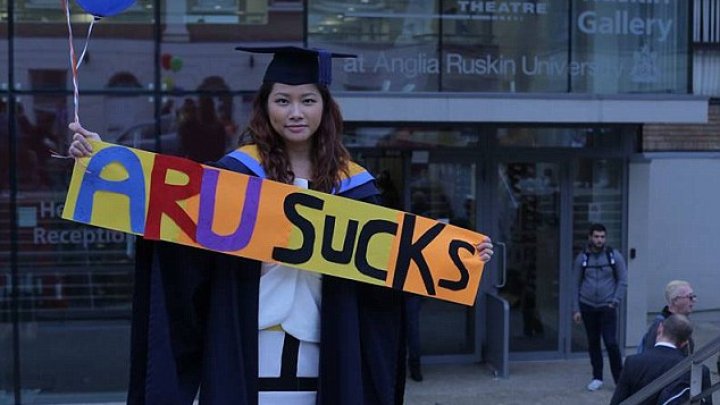Graduate suing Anglia Ruskin University for making misleading claims about high-quality teaching and career prospects
 foto: dailymail.co.uk // Facebook
foto: dailymail.co.uk // Facebook
A graduate is suing her university for £60,000 over her 'Mickey Mouse' degree in international business strategy.
Pok Wong, 29, claims that Anglia Ruskin University made fraudulently misleading claims in its prospectus about high-quality teaching and career prospects.
She is seeking damages for a breach of contract and fraudulent misrepresentation, according to the Telegraph.
Ms Wong also claimed on Facebook that she was 'forcibly removed' from the stage during her graduation day for protesting about the quality of her course.
Her legal action is part of a growing trend by students seeing themselves as 'customers' who demand certain expectations are met, particularly after the rise in tuition fees.
She added that the prospectus claims about employment prospects and education quality encouraged her to move from Hong Kong to Cambridge to study.
The £60,000 she is asking for includes her tuition fees and living costs during the two-year course.
She claims that the prospectus fraudulently claimed the business school was a 'renowned center of excellence' and students would be 'well equipped' for jobs - despite it ranking poorly in four university guides between 2010-11.
Lawyers for the university have said the prospectus did not form a 'real' contract with students and so tuition fees should not be refunded.
They also added that Ms Wong may have struggled to get work because she spent 'time and energy' on a campaign discrediting the university.
A spokesperson for the university said: 'Her complaints have been through the full Office of the Independent Adjudicator process.
'She then made a complaint to the Information Commissioner's Office, which was rejected after a thorough investigation. Subsequently she has launched legal action against us and has been required to pay our costs at an earlier hearing.
'As this case is before the court we will not be saying anything further at this stage.'
Last year six universities were told to take down certain marketing claims by the Advertising Standards Authority.
One of the universities, the University of Leicester, was told to stop claiming it was a 'top 1% world university'.
Although they claimed it was based on its ranking in several different world league tables, the university complied with the decision and removed the claim from its prospectus and website.
Read more on Dailymail.co.uk